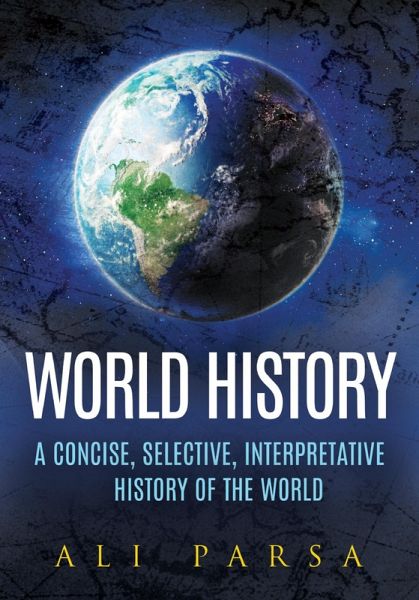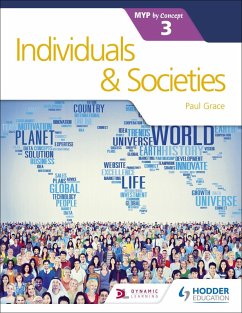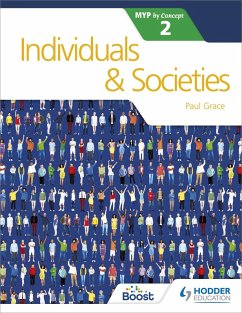
World History (eBook, ePUB)
A Concise, Selective, Interpretive History of the World

PAYBACK Punkte
0 °P sammeln!
This book provides a brief history of the world, focusing on major civilizations while employing a few strong interpretive themes. It could be used as a world history text for students and the ordinary public who are sometimes intimidated or overwhelmed by the detailed content of available history textbooks, or as a complementary book for world history classes. It could also benefit educated and intellectually inclined people by opening a stimulating topic of discussion. Upper division or graduate courses in historiography or philosophy of history might benefit from it as a review of world his...
This book provides a brief history of the world, focusing on major civilizations while employing a few strong interpretive themes. It could be used as a world history text for students and the ordinary public who are sometimes intimidated or overwhelmed by the detailed content of available history textbooks, or as a complementary book for world history classes. It could also benefit educated and intellectually inclined people by opening a stimulating topic of discussion. Upper division or graduate courses in historiography or philosophy of history might benefit from it as a review of world history, but also in the study of historiography as well. Ultimately, the book is didactic in nature and its goal is to teach history to students of history. In general, it presents an optimistic, if cautious, and realistic view of history in a coherent and meaningful narrative. It is hoped that through the understanding of history a new global ethic can ideally be envisioned and thereby achieved.
The main underlying premise in this book is that successful civilizations-ones providing safety, prosperity, and room for individual growth and creativity-have from ancient times to the present flourished when responding creatively to the major challenges of their time and their environment. Second, many successful civilizations appear to have a life span of about two hundred years or some multiple of that number (e.g., the Greek's Golden Age, the Romans, the Persians, the Chinese Han Dynasty). This number might be a consequence of the life span of individual human beings, about thirty years, with two hundred years constituting about six generations. These six generations might be divided into two first generations (father and son) of visionaries, two second generations of benefactors, and then two generations of critics. This hypothesis assumes the father-son relationship to be more direct, stronger, and more real than ideal. Third, throughout the dialectical process and cycles of integration and disintegration (or centralization and decentralization), societies tend to move toward expansion of greater human intellectual and political unity.
About the author:
Born in Tehran, Iran, Ali Parsa came to the US to study architecture, biochemistry, and philosophy. He then received a double masters at UCLA in history and Islamic/religious studies, followed by a Ph.D. in history. He has been teaching world history, comparative religions, humanities, architecture, philosophy of religion, and gender and religion at universities and colleges in California since 1998.
As a young man, Parsa returned to Iran in 1979 to join the revolution against the shah, and though he had to escape back to the US after Khomeini came to power, he continued his political activities against the Iranian regime to promote religious freedom, equality, and women's rights.
Dr. Parsa seeks ways for people to appreciate different points of view that go beyond political correctness. To that end, he calls for a paradigm shift to encompass new sciences-quantum, relativity, new cosmology-and a corresponding reinterpretation of human history.
His last book, The Mind of the Historian: Causation on Philosophy of History, which reveals unavoidable biases of historians, is used in graduate-level classes in historiography.
Dr. Parsa lives in Southern California with his wife and three children.
The main underlying premise in this book is that successful civilizations-ones providing safety, prosperity, and room for individual growth and creativity-have from ancient times to the present flourished when responding creatively to the major challenges of their time and their environment. Second, many successful civilizations appear to have a life span of about two hundred years or some multiple of that number (e.g., the Greek's Golden Age, the Romans, the Persians, the Chinese Han Dynasty). This number might be a consequence of the life span of individual human beings, about thirty years, with two hundred years constituting about six generations. These six generations might be divided into two first generations (father and son) of visionaries, two second generations of benefactors, and then two generations of critics. This hypothesis assumes the father-son relationship to be more direct, stronger, and more real than ideal. Third, throughout the dialectical process and cycles of integration and disintegration (or centralization and decentralization), societies tend to move toward expansion of greater human intellectual and political unity.
About the author:
Born in Tehran, Iran, Ali Parsa came to the US to study architecture, biochemistry, and philosophy. He then received a double masters at UCLA in history and Islamic/religious studies, followed by a Ph.D. in history. He has been teaching world history, comparative religions, humanities, architecture, philosophy of religion, and gender and religion at universities and colleges in California since 1998.
As a young man, Parsa returned to Iran in 1979 to join the revolution against the shah, and though he had to escape back to the US after Khomeini came to power, he continued his political activities against the Iranian regime to promote religious freedom, equality, and women's rights.
Dr. Parsa seeks ways for people to appreciate different points of view that go beyond political correctness. To that end, he calls for a paradigm shift to encompass new sciences-quantum, relativity, new cosmology-and a corresponding reinterpretation of human history.
His last book, The Mind of the Historian: Causation on Philosophy of History, which reveals unavoidable biases of historians, is used in graduate-level classes in historiography.
Dr. Parsa lives in Southern California with his wife and three children.
Dieser Download kann aus rechtlichen Gründen nur mit Rechnungsadresse in A, B, BG, CY, CZ, D, DK, EW, E, FIN, F, GR, H, IRL, I, LT, L, LR, M, NL, PL, P, R, S, SLO, SK ausgeliefert werden.













